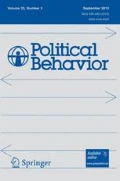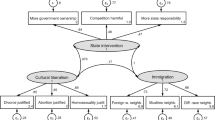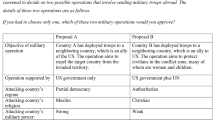Abstract
A relatively recent innovation in research on attitude constraint is the specification of hierarchical models of mass belief systems, where general orientations are assumed to determine or constrain more specific policy attitudes. But while this research has been able to demonstrate a strong correlation between general and specific idea elements, the causal direction of the relationship has been assumed rather than tested. Using panel data collected during a period of constancy in the international environment, we attempt to untangle the causal ordering of general orientations and specific policy attitudes in the realm of international politics. In accord with hierarchical models, we find, first, that general orientations (e.g., militarism and containment postures) are more stable than many specific policy preferences (e.g., attitudes toward defense spending and U.S. involvement in Central America) and, second, much of the over-time consistency in policy attitudes is generated by these more general orientations. We conclude with a discussion of the implications of this work for studies of attitude constraint, one of which is thegeneral applicability of the procedure for investigating top-down versus bottom-up models of constraint in domains outside the international realm.
Similar content being viewed by others
References
Achen, C. H. (1983). Toward theories of data: The state of political methodology. In A. Finifter (ed.),Political Science: The State of the Discipline. Washington, DC: The American Political Science Association.
Achen, C. H. (1975). Mass political attitudes and the survey response.American Political Science Review 69: 1218–1231.
Adams, William C. (1984). Before and after “The Day After”: A nationwide survey of the movie's impact. Paper presented at International Communications Association Meeting, San Francisco, May, 1984.
Almond, Gabriel (1950).The American People and Foreign Policy. New York: Harcourt, Brace.
Barton, Allen H. and Parsons, Wayne (1977). Measuring belief system structure.Public Opinion Quarterly 41: 159–180.
Bennett, Stephen E. (1974). Attitude structures and foreign policy opinions.Social Science Quarterly 55: 732–742.
Bodenhausen, Galen V., and Lichtenstein, M. (1985). The impact of processing objectives, evidence and stereotypes on memory and judgments in a criminal trial scenario.Journal of Personality and Social Psychology 52: 871–880.
Carmines, E. G., and McIver, J. D. (1983). An introduction to the analysis of models with unobserved variables.Political Methodology 9: 51–102.
Conover, Pamela, and Feldman, Stanley (1984). How people organize their political world: A schematic model.American Journal of Political Science 28: 95–126.
Converse, P. E. (1964). The nature of mass belief systems in mass publics. In D. Apter (ed.),Ideology and Discontent. New York: Wiley.
Converse, P. E., and Markus, G. B. (1979). Plus ca change ... The new CPS election study panel.American Political Science Review 73: 32–49.
Coveyou, Michael R. and Pierson, James (1977). Ideological perceptions and political judgement: Some problems of concept and measurement.Political Methodology 4: 77–102.
Erskine, Hazel G. (1963). The polls: Exposure to international information.Public Opinion Quarterly 27: 658–662.
Feldman, S. (1983). Economic individualism and mass belief systems.American Politics Quarterly 11: 3–29.
Feldman, S. (1988). Structure and consistency in public opinion: The role of core beliefs and values.American Journal of Political Science 32: 416–440.
Fiorina, M. (1981).Retrospective Voting in American National Elections. New Haven: Yale University Press.
Fiske, Susan, and Taylor, Shelley (1991).Social Cognition, 2nd ed. New York: McGraw-Hill.
Hargens, Lowell J. (1988). Estimating multiequation models with correlated disturbances. In J. Scott Long (ed.),Common Problems/Proper Solutions: Avoiding Error in Quantitative Research. Newbury Park, California: Sage Publications.
Hastie, Reid (1986). A primer of information processing theory for the political scientist. In Richard R. Lau and David O. Sears (eds.),Political Cognition. Hillsdale, NJ: Lawrence Erlbaum Associates.
Heise, D. R. (1969). Separating reliability and stability in test-retest correlations.American Sociological Review 34: 93–101.
Hurwitz, J. M., and Peffley, M. A. (1987). How are foreign policy attitudes structured? A hierarchical model.American Political Science Review 81: 1099–1120.
Iyengar, Shanto (1989). How citizens think about national issues: A matter of responsibility.American Journal of Political Science 33: 878–900.
Jackson, John E. (1983). The systematic beliefs of the mass public: Estimating political preferences with survey data.The Journal of Politics 45: 840–865.
Joreskog, K. G., and Sorbom, D. (1990).LISREL: Analysis of Linear Structural Relationships by the Maximum Likelihood Method. Mooresville, IN: Scientific Software, Inc.
Judd, Charles M., and Milburn, Michael A. (1980). The structure of attitude systems in the general public: Comparisons of a structural equation model.American Sociological Review 45: 627–643.
Kinder, D. R. (1983). Diversity and complexity in public opinion. In A. Finifter (ed.),Political Science: The State of the Discipline. Washington, DC: The American Political Science Association.
Krosnick, Jon A., and Kinder, Donald R. (1990). Altering the foundation of presidential support through priming.American Political Science Review 84: 497–512.
Kuklinski, James H., Riggle, Ellen, Ottati, Victor, Schwartz, Norbert, and Wyer, Robert S., Jr. (1991). The cognitive and affective bases of political tolerance judgments.American Journal of Political Science 35: 1–27.
Lodge, Milton, and Hamill, Ruth (1986). A partisan schema for political information processing.American Political Science Review 80: 505–519.
Lipset, S. M. (1966). The president, the polls, and Vietnam.Transaction September/October: 19–24.
Luskin, R. (1987). Measuring political sophistication.American Journal of Political Science 31: 856–899.
Luskin, R. (1990). Explaining political sophistication.Political Behavior 12: 331–362.
Maggiotto, Michael A., and Wittkopf, Eugene (1981). American public attitudes toward foreign policy.International Studies Quarterly 25: 601–631.
Markus, Gregory (1979).Analyzing Panel Data. Sage University Paper Series on Quantitative Applications in the Social Sciences, 07-018. Beverly Hills and London: Sage.
Mueller, John E. (1973).War, Presidents, and Public Opinion. New York: Wiley.
Ottati, Victor C. (1990). Determinants of political judgments: The joint influence of normative and heuristic rules of inference.Political Behavior 12: 159–180.
Ottati, Victor C., and Wyer, Robert S. (1990). The cognitive mediators of political choice: Toward a comprehensive model of political information processing. In A. Ferejohn and J. H. Kuklinski (eds.),Information and the Democratic Process. Urbana, IL: University of Illinois Press.
Peffley, M. A., and Hurwitz, J. M., (1985). A hierarchical model of attitude constraint.American Journal of Political Science 29: 871–890.
Peffley, Mark, and Hurwitz, Jon (1987). Report on foreign policy items, 1987 pilot study. Report prepared for the National Election Service.
Peffley, Mark, and Hurwitz, Jon (1992). International events and foreign policy belief systems: Public responses to changing Soviet-American Relations.American Journal of Political Science 36.
Rokeach, M. (1968).Beliefs, Attitudes, and Values: A Theory of Organization and Change. San Francisco: Jossey-Bass.
Sears, D. O., Huddy, L., and Schaffer, L. C. (1986). A schematic variant of symbolic politics theory as applied to racial and gender equality. In R. R. Lau and D. O. Sears (eds.),Political Cognition. Hillsdale, NJ: Erlbaum.
Siman, Rita (1975).Public Opinion in America: 1936–1970. Chicago: Rand McNally.
Sniderman, P. M., Brody, R., and Kuklinski, J. (1984). Policy reasoning and political values: The problem of racial equality.American Journal of Political Science 28: 75–94.
Sniderman, P. M., Brody, R., and Tetlock, P. (1991).Reasoning and Choice: Explorations in Political Psychology. Cambridge, MA: Cambridge University Press.
Sobel, R. (1987). Public opinion toward U.S. involvement in Central America. Paper presented at the Meetings of the American Political Science Association. Chicago, IL.
Stokes, Donald E. (1966). Some dynamic elements of contests for the presidency.American Political Science Review 60: 19–28.
Tetlock, P. E., and McGuire, C. (1986). Cognitive perspectives on foreign policy. In S. Long (ed.),Political Behavior Annual, vol. I. Boulder, CO: Westview Press.
Tversky, Amos, and Kahneman, David (1974). Judgment under uncertainty: Heuristics and biases.Science 185: 1124–1131.
Wheaton, Blair, Muethen, Bengt, Alwin, Duane F., and Summers, George F. (1977). Assessing reliability and stability in panel models. In David Heise (ed.),Sociological Methodology. San Francisco: Jossey-Bass.
Wittkopf, Eugene (1990).Faces of Internationalism. Durham, NC: Duke University Press.
Wiley, D. E., and Wiley, J. A. (1970). The estimation of measurement error in panel data.American Sociological Review 35: 112–116.
Author information
Authors and Affiliations
Additional information
The order of the authors' names was decided by a coin toss. An earlier version of this paper was presented at the 1988 Annual Meeting of the Midwest Political Science Association, Chicago Hilton and Towers, Chicago, Illinois, April 14–16, 1988.
Rights and permissions
About this article
Cite this article
Peffley, M., Hurwitz, J. Models of attitude constraint in foreign affairs. Polit Behav 15, 61–90 (1993). https://doi.org/10.1007/BF00993417
Issue Date:
DOI: https://doi.org/10.1007/BF00993417




